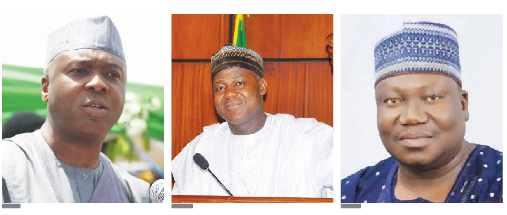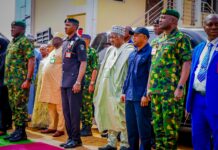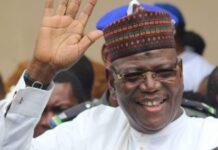Governance takes backstage as APC NASS leadership crisis assumes widening dimensions,
Editor, Politics/Features, EMEKA ALEX DURU, writes.
By the close of Thursday, June 25, 2015, it had become apparent that the crisis in the All Progressives Congress (APC) over the leadership of the National Assembly (NASS) was far from being over. If anything, the impasse had taken further dimensions that even the most ardent supporter of the party feared the party would do itself in, if not properly handled.
The face-off began to take turns for the unpredictable when, on June 9, legislators in the Senate and House of Representatives, selected leaders that were not those proposed by APC leadership. Senator Bukola Saraki emerged Senate President, against Ahmed Lawan that was backed by APC. In the House, Yakubu Dogara was elected Speaker, to the detriment of Femi Gbajabiamila that was the party’s candidate.
Before the Thursday session, many had thought that the crisis would have been resolved by the party. But that was not the case. The outcome of interactions in both chambers rather gave indications of the crisis taking more ominous dimensions in the days ahead.
APC had, before the date, listed Lawan for Majority Leader, Sola Adeyeye (Chief Whip), George Akume (Deputy Majority Leader) and Abu Ibrahim (Deputy Chief Whip). The party, in making the recommendation, had argued that carrying the listed senators on board would go a long way in assuaging the feeling of bitterness in their group over the June 9 emergence of Saraki where they did not participate.
It also had reasoned that the exercise would cement the crack that had developed among its ranks in NASS.
APC leadership, in going about the directive, had trumpeted supremacy of the party in the conduct of its members and the need to ensure discipline to whip the senators into line. Part of its argument was that the standing rule in the chambers prescribed that those to occupy the principal offices should be nominated “by” the party.
But the Saraki group would have none of this. It rather encouraged members of the various caucuses of the Senate to nominate their candidates, arguing that what was prescribed was that principal officers should be nominated “from” the party.
Thus, Saraki announced Ali Ndume as Senate Leader, Bala Ibn Na’Allah (Senate Deputy Leader) and Francis Alimikhena (Deputy Chief Whip). The Lawan-led camp promptly objected to the list read out by the Senate President.
For the House of Representatives, APC had recommended Gbajabiamila (Majority Leader), Alhassan Ado Doguwa (Deputy House Leader), M. T. Monguno (Chief Whip) and Pally Iriase (Deputy Chief Whip). The House, however, descended into full blown crisis on Thursday, as rancorous members disrupted its session and physically assaulted one another over the election of principal officers.
Members broke into two factions, one supporting the ruling party, which sought to choose the principal officers, and another backing the Speaker, who insisted on defying the directive. In apparent attempt to defuse tension, the House adjourned till July 21.
Even with the adjournment, there are no indications that the fire in NASS would be extinguished soonest. The fear among keen watchers of the events in both chambers is that seed of deep crisis of confidence has been sowed in the members.
It is reasoned that with the ugly dimensions of the impasse, it would be difficult to get a leadership in the Senate and House that would be acceptable to the different tendencies in NASS.
This is especially as the APC leadership, which should have been setting the template in harmonious relationship among members, is also seen as a major player in the confusion. The party’s recommendation for offices has also not gone down well with perceptive analysts.
Lawan, its candidate for Senate Leader, is from the same North East with Dogara, the Speaker. Its preferred choice for House Chief Whip, Monguno, is also from the zone.
In related circumstance, Akume, who APC had programmed for Deputy Senate Leader, hails from North Central as Saraki. Adeyeye, who it had positioned for Senate Chief Whip, and Gbajabiamila that it had positioned for House Majority Leader, are from South West where the Deputy Speaker, Yusuf Lasun, hails from. In fact, Lasun and Adeyeye are from Osun State.
The grouse critics have with the recommendations is that apart from its perceived lopsidedness in the selection of candidates from particular favoured zones, there was also the obvious attempt to relive the spectre of imposition the lawmakers had resisted in their earlier rejection of Lawan and Gbajabiamila.
To supporters of Saraki and Dogara, allowing the APC list to fly would literally amount to going to bed with an enemy. “That would amount to taking the joke too far. It would be a costly gamble on the part of the Senate President and Speaker. How would they be comfortable having professed opponents as principal officers – key confidants? Nobody would take that. I would rather quit the position of the Senate President or Speaker than allow that to happen. That would amount to walking on broken bottles in a bid to have peace. That is no peace. Nobody would take that,” fumed a member of the immediate past House of Representatives who is currently working with the Dogara group.
Members of the Saraki group, TheNiche gathered, share in the sentiment. APC, on its own, is not relenting, or so it appears.
The concern by observers, therefore, is that the nation, in the face of the emerging confusion, may continue to remain in its current status of motion without movement. The other day, for instance, President Muhammadu Buhari had raised the alarm that the country was running on empty treasury, given the level of looting that had taken place in the past. He had vowed to apply all legal and constitutional means to recover the looted funds.
While the administration battles with paucity of funds to hit the ground running, there has been the resurgence of Boko Haram. In the face of the perceived lethargy, the goodwill that had trailed the government at inauguration appears to be thinning.
Curiously, what is rather seen to be playing out subtly is the politics of who occupies what office in 2019. With what has been presumed to be Buhari’s disinterest in second term, the space seems open for the APC hawks. It is in this regard that many see the developments in the Senate as dress rehearsals for 2019 presidential race.
For one, Saraki, even as Kwara State governor, had not hidden his desire for the apex job in the land. His return to the Senate and emergence as Senate President were all in attempts at garnering the necessary experience and expanding the network of contacts for the encounter. This is why those who read his lips and steps, perhaps, very well, do not see him giving in to APC threats and/or overtures.
Saraki’s opponents that are alleged to be nudged by former Lagos governor, Bola Tinubu, also understand the game and are not leaving any stone unturned. The idea of planting Lawan and Akume around him, it is learnt, is essentially to checkmate him or even plot the crash of his ambition.
Components of the agenda by the various groups are yet to be fully unfolded. But the major impact of the widening dimensions of the APC NASS leadership crisis is the obvious stagnation on the wheels of governance.
This is because the legislative empowerments for running the government may not come handy in the face of the wrangling in NASS.















